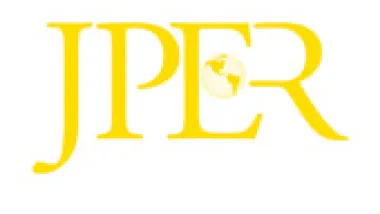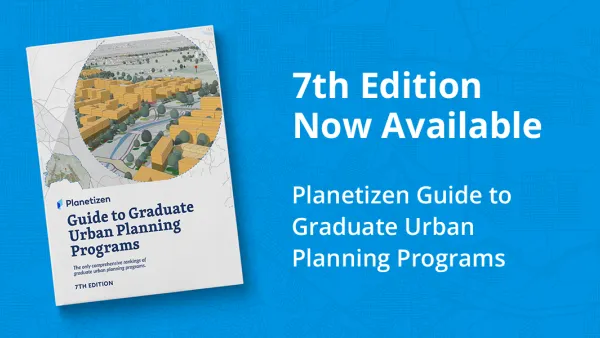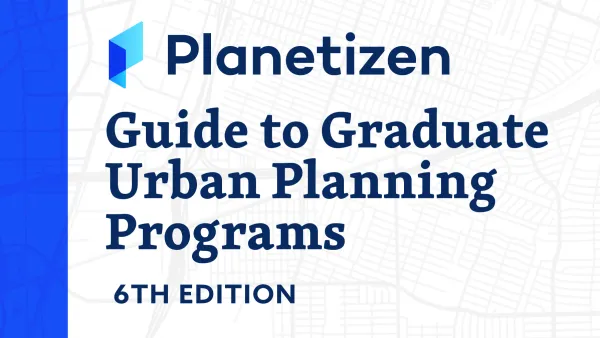Sergio Peña, of El Colegio de la Frontera Norte in Mexico, writes about a recent article he authored in the Journal of Planing Education and Research.

This article addresses an important question that is relevant not only for the context of Mexico's higher education but also for others around the world. The main question that is explored and analyzed in the article is: Are planning programs forming professionals capable of addressing the challenges that cities and regions face in the 21st century? The main argument in the paper is that the issues and challenges that planning education in developed countries faces are not unique or confined to more developed planning systems; those same issues can also be extended to developing countries. Even though the context and history of planning in these regions are specific, both planning systems are struggling with similar challenges posed by democracy and globalization.
A review of the debate among experts such as John Friedmann (1996) and Rachel Alterman (1992), among others, was included to get a sense of what planning education and curricula ought to be. The views of these experts in some way has influenced the Planning Accreditation Board (PAB) as far as the recommendations for the planning curricula. The experts agree that there is a need for planning curricula to take into account other types of knowledge, skills and abilities (KSAs) beyond those emphasized by the rational planning model; for instance, there is a need to consider diversity, ethics, public participation, and qualitative and communicative methodologies capable of dealing with subjectivity and inter-subjective knowledge.
The study collected data from university planning programs in Mexico at the master level (12) and their respective syllabi (253 total). Additionally, a database was compiled of 128 planners working at local planning institutions. The data was coded and analyzed using Atlas.ti software.
The paper showed that planning education in Mexico, to a great extent, continues to teach the classical rational approach, which some experts in planning curricula argue provides the kind of skills and knowledge that constitute the basis of planning. The general planning knowledge and skills that are taught most often are related to understanding patterns of human settlement; the syllabi analyzed are more focused on spatial aspects and how human settlements evolve and function. Also, the results show that data collection, reporting information and quantitative research are the most emphasized skills. Planning pedagogy in Mexico is strong in conveying and communicating information to students and future planners; there is also an important emphasis on classroom discussion. However, there are some weaknesses in terms of learning by doing or action that is critical to bridge the gap between theory and practice.
The data collected show that 59.5% of the alumni that graduated are employed in the public sector, 28.5% private, 9.6% social sector, and 35.9% in academia. The data collected on planners' job descriptions show that planners' main function consists of the ability to analyze demographic information to discern trends in population, employment, and health. Planners with degrees in architecture and urban planning are the ones most associated with the plan-making process, from visioning alternatives to data collection and analysis, urban design and knowledge of plan making. Planners with certain degrees tend to have a specific focus such as planners with law degrees who focus mostly on understanding of the legal foundations for land use regulations. Similarly, those who studied computer science tend to focus on technical aspects such as GIS.
The main conclusion is that planning curricula are still focusing largely on what Friedmann (1996) called planning as a product of the "illustration," where, through rationality, planners try to "dominate" political forces. Mexico has traveled a long way towards consolidating the urban and regional planning profession. But there is still a long road ahead to improve the planning curricula and develop more and stronger professional organizations, because, as Alterman (1992) points out, quality planning education and strong professional organizations are both necessary for the profession to flourish.
References
Alterman, Rachelle. 1992. "A Transatlantic View of Planning Education and Professional Practice." Journal of Planning Education Research 12, no. 1(October): 39-54.
Friedmann, John. 1996. "The core curricula in planning revisited." Journal of Planning Education and Research 15, no. 2 (January): 89-104.

National Parks Layoffs Will Cause Communities to Lose Billions
Thousands of essential park workers were laid off this week, just before the busy spring break season.

Retro-silient?: America’s First “Eco-burb,” The Woodlands Turns 50
A master-planned community north of Houston offers lessons on green infrastructure and resilient design, but falls short of its founder’s lofty affordability and walkability goals.

Delivering for America Plan Will Downgrade Mail Service in at Least 49.5 Percent of Zip Codes
Republican and Democrat lawmakers criticize the plan for its disproportionate negative impact on rural communities.

Test News Post 1
This is a summary

Test News Headline 46
Test for the image on the front page.

Balancing Bombs and Butterflies: How the National Guard Protects a Rare Species
The National Guard at Fort Indiantown Gap uses GIS technology and land management strategies to balance military training with conservation efforts, ensuring the survival of the rare eastern regal fritillary butterfly.
Urban Design for Planners 1: Software Tools
This six-course series explores essential urban design concepts using open source software and equips planners with the tools they need to participate fully in the urban design process.
Planning for Universal Design
Learn the tools for implementing Universal Design in planning regulations.
EMC Planning Group, Inc.
Planetizen
Planetizen
Mpact (formerly Rail~Volution)
Great Falls Development Authority, Inc.
HUDs Office of Policy Development and Research
NYU Wagner Graduate School of Public Service






























